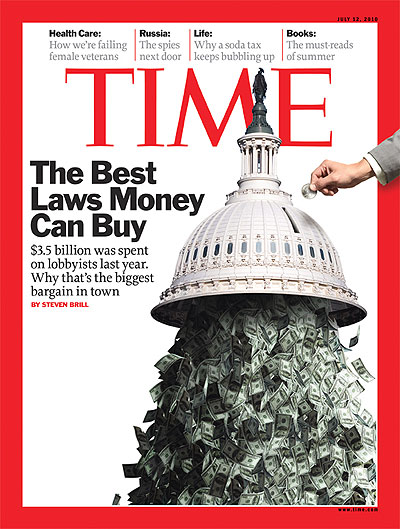 In line with this morning’s early post (Four out of Five Americans See Financial Reforms as Ineffectual), I discovered, quite by accident, a horrifying little article in the July 12 Time magazine (seen at my hair cutter’s and local barber shops everywhere).
In line with this morning’s early post (Four out of Five Americans See Financial Reforms as Ineffectual), I discovered, quite by accident, a horrifying little article in the July 12 Time magazine (seen at my hair cutter’s and local barber shops everywhere).
The online version is pretty skimpy, which is probably why I didn’t see it until now. But the details are quite horrific.
The article’s subhed tells you all you need to know: “Why Lobbying Is Washington’s Best Bargain; Lobbyists say for just a few million, they can make clients billions:”
“Lobbyists [are] the best bargain in Washington. Capitol Tax Partners, for example, is one of 1,900 firms that house more than 11,000 lobbyists registered to operate in Washington. Last year, according to the Center for Responsive Politics (CRP), firms like Capitol Tax were paid a total of $3.49 billion for unraveling the mysteries of the tax code for a variety of businesses. According to Capitol Tax co-founder Lindsay Hooper, his firm provided “input and technical advice on various tax matters” to such clients as Morgan Stanley, 3M, Goldman Sachs, Chanel, Ford and the Private Equity Council, which is a trade group trying to head off a plan to increase taxes on what’s called carried interest, a form of income enjoyed by the heavy hitters who run venture-capital and other types of private-equity funds.”
The print edition specifically cites Derivative trading banks and Auto Dealers as examples of ROI. Derivatives trading banks spent $28 million, and got to avoid allocating $5 billion to $7 billion to back their trades. The gain in annual profits is about $3 billion — with the risk remaining on the taxpayers. A pretty nifty return on lobbying investment (minus the lobbyists soul burning in Hell for eternity — but that’s a small price to pay.
Auto Dealers made out even better: They dropped less than $10 million dollars ($6.3 million on lobbying, and an additional $3.4 million in campaign contributions). For their troubles, the dealers get to keep $20 billion each year in undisclosed added interest and fee kickbacks to over-priced loans.
The consumer? Well, apparently, Congress is sending each voter a matching velcro glove and sock set . . .
>
Source:
Government for Sale: How Lobbyists Shaped the Financial Reform Bill
By Steven Brill
Time, Jul. 01, 2010
http://www.time.com/time/politics/article/0,8599,2000880,00.html


What's been said:
Discussions found on the web: